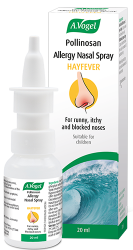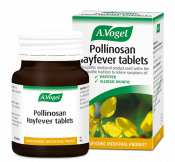Pollen showers
If you suffer from hayfever there will probably be times when your symptoms are so severe that it actually feels like the pollen is raining down on you! Well, this scenario isn’t so far away from reality.

When the weather is humid, pollen grains rise with the heat. However, as we enter into evening territory and the temperature begins to fall, pollen grains drop back down to ground level. This is actually called a pollen shower and explains why hayfever symptoms can get worse at night.
These pollen showers are particularly problematic in the city because large concentrations of concrete buildings emit more heat. This means it takes longer for the air to cool and pollen levels drop much later on in the evening, hence your symptoms become problematic when you head to bed.
You can explore my hayfever hub for more information on pollen counts. There you’ll find blogs such as ‘Are pollen counts higher in the morning or evening?’ and ‘What causes a high pollen count?’
Top tip: Use our local pollen count to keep track of levels in your area! It has over 30,000 locations and includes details on grass, tree and weed pollen.
Pollen in the area
Pollen showers are not the only cause of allergy symptoms at night though as there are a variety of ways it can reach your bedroom directly.
As you go about your daily routine pollen collects on your clothes, hair and shoes and so when you return home it can be easily distributed around various rooms. However, pollen is particularly problematic if it gets into your hair as from here it can transfer to your pillow, bringing on symptoms around the nose, eyes and mouth when you sleep.
So, if pollen triggers your allergy symptoms, this is just another reason they can become more severe at night.
Top tip: If pollen counts are high, change out of your clothes as soon as you return home and take your shoes off before stepping indoors. Both of these steps will avoid spreading pollen about your house. Also, be sure to have a shower before going to bed to stop pollen from getting on to your pillow via your hair.
Mould and dust in your bedroom
If your allergy symptoms suddenly worsen when your head hits the pillow it could also be to do with the environment in which you are sleeping. Dust mites, another common allergy trigger, thrive in warm, clean areas such as mattresses, pillows, carpets and duvets.
Mould on the other hand, can arise when an area gets damp. This more common in bathrooms and kitchens but if there is a problem with insulation then it can crop up in bedrooms too.
As you spend a lot of time in your bedroom at night, if you are exposed to these things there then allergy symptoms may crop up.
Top tip: Change you bed sheets regularly (at least once a week, if not more) and address any sources of dampness – you’ll probably need to call in an expert for this!
Animals sharing your room
Yes, I know that if you’re a pet owner it’s near impossible to keep Max or Fluffy out of your bedroom – even if you move them they often find a way to get back in! However, as they explore your room and sleep in your bed they are spreading their dander around. Dander consists of animal fur, urine and saliva and it is this rather than the animal itself that can bring on allergy symptoms at night.

Top tip: Keep your bedroom door shut to all pets! Also if you’ve been to a friend or family members house where there are pets make sure you shower and change your clothes as soon as you get in to prevent spreading dander around your home.
Nasal problems
Blocked and runny noses are common occurrences amongst allergy sufferers and unfortunately this won’t do your sleep much good.
When we lie down the “gunk” in our nose travels backwards towards the throat. This can, in turn, bring on coughing and unsurprisingly this makes it hard to sleep!
Top tip: If you are suffering from nasal problems then keep your head propped up with a couple of extra pillows. Also, you could try our Pollinosan Luffa Nasal Spray which cleanses the nose of allergens to make the area feel more comfortable.
How to deal with allergies at night
Antihistamines are regularly prescribed by doctors for allergy symptoms. When the body comes into contact with an allergen it releases histamine in order to get rid of it but this brings on the likes of swelling, itching and nasal problems. Antihistamines work to relieve these symptoms by blocking the release of histamine.
Herbal remedies however, provide another means of dealing with allergies at night. I’ve already mentioned our Pollinosan Luffa Nasal Spray but for the other symptoms caused by allergies you could turn to our Neem Cream. This soothes sore, red and irritated skin that comes about after contact with allergens. Also, our Moisturising Eye Drops address dry, irritated and tired eyes which, again, contact with allergens can cause.
If you’d like to discover some other natural ways of dealing with allergies then have a look at my blog ‘Fight allergies naturally’.











